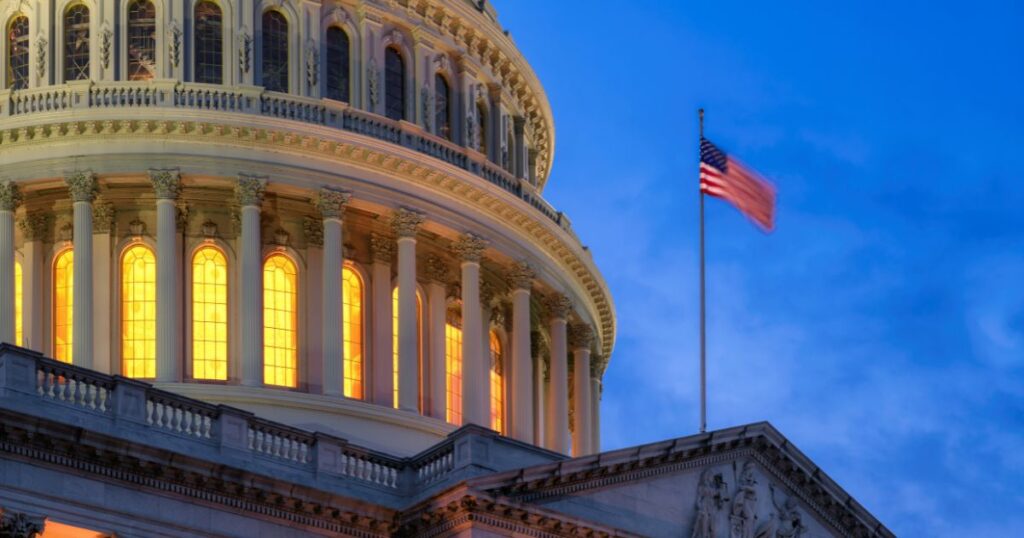The House Appropriations Committee’s last week voted 34-28 on the Fiscal Year 2026 Commerce, Justice, Science, and Related Agencies Appropriations Act sends a clear message about congressional priorities regarding cannabis policy. While the committee advanced spending measures worth $76.8 billion, buried within the legislation lies Section 607—a provision that would effectively handcuff any future attempts at federal marijuana rescheduling.
This legislative maneuver comes as President Trump has indicated his administration will revisit the cannabis rescheduling process initiated under President Biden. Trump told reporters in August that he is “looking at” the rescheduling proposal and would make a decision “over the next few weeks.” The House committee’s preemptive strike reveals the deep political divisions surrounding cannabis policy, but it also highlights a fundamental misunderstanding of what meaningful cannabis reform should look like.
The real issue isn’t whether Trump should or shouldn’t reschedule marijuana. The problem is that rescheduling represents a half-measure that fails to address the core injustices of cannabis prohibition. Rather than engaging in political theater over scheduling categories, Congress should focus on what cannabis advocates have been demanding for years: complete removal of marijuana from the Controlled Substances Act.
The Rescheduling Block: What Section 607 Actually Does
Section 607 of the appropriations bill contains straightforward language with far-reaching implications: “None of the funds appropriated or otherwise made available by this Act may be used to reschedule marijuana or to remove marijuana from the schedules established under section 202 of the Controlled Substances Act.”
This provision effectively removes the executive branch’s ability to pursue any changes to marijuana’s federal classification through administrative processes. The language is intentionally broad, covering both rescheduling to a different category and complete descheduling. By managing funding, Congress influences cannabis policy while limiting the actions of federal agencies.
The timing is significant. Under the Biden administration, the Department of Justice recommended moving cannabis from Schedule I to Schedule III of the Controlled Substances Act. This process has faced delays amid administrative hearings and legal challenges, creating an opening for the Trump administration to potentially reverse or modify the approach. The House committee’s action attempts to close that window entirely.
Why Rescheduling Fails Cannabis Reform
The debate over rescheduling marijuana from Schedule I to Schedule III misses the fundamental problem with the current system. Schedule III classification would acknowledge cannabis has accepted medical uses while maintaining moderate potential for abuse—a step forward from the current Schedule I designation that claims no accepted medical use. However, this incremental change preserves the failed framework of prohibition while creating new problems.
Schedule III substances remain federally controlled with significant restrictions on research, distribution, and access. Medical cannabis patients would still face federal-state conflicts, banking restrictions would largely persist, and the criminal justice system would continue criminalizing adult use. Small businesses and social equity programs would struggle under federal regulations designed for pharmaceutical companies, not community-based cannabis operations.
The rescheduling approach also ignores the successful state-level experiments that have demonstrated cannabis prohibition causes more harm than the plant itself. Thirty-eight states plus the District of Columbia have legalized medical marijuana, while twenty-four states have embraced adult-use programs. These jurisdictions haven’t seen the social chaos prohibitionists predicted. Instead, they’ve generated billions in tax revenue, created legitimate jobs, and reduced incarceration rates for nonviolent drug offenses.
Case for Complete Cannabis Descheduling
True cannabis reform requires removing marijuana entirely from the Controlled Substances Act. This would treat cannabis like alcohol—regulated at the state level with federal oversight focused on interstate commerce, taxation, and preventing access by minors. Several compelling reasons support this path.
Complete descheduling would eliminate federal-state conflicts that currently force cannabis businesses and consumers to navigate contradictory legal frameworks. Banks could serve cannabis companies without fear of federal penalties, reducing reliance on cash transactions and improving public safety.
Small businesses and social equity operators could access traditional financing, insurance, and banking services that remain largely unavailable under current prohibition.
Research restrictions would disappear under descheduling, allowing scientists to study cannabis without burdensome federal approval processes. The current system requires researchers to obtain cannabis from the University of Mississippi’s federally approved facility, which produces material that bears little resemblance to products consumers actually use. Unrestricted research could unlock cannabis’s therapeutic potential while providing evidence-based guidance for regulation.
Criminal justice reform represents perhaps the strongest argument for descheduling. Despite state-level legalization efforts, federal prohibition continues enabling discriminatory enforcement that disproportionately impacts communities of color.
Over 300,000 Americans were arrested for marijuana possession in 2020 alone, perpetuating cycles of incarceration and economic disadvantage that prohibition created.
The Political Reality Check
The House Appropriations Committee’s action reflects political calculations rather than evidence-based policy making. Republicans who supported the rescheduling block simultaneously preserved protections for state medical marijuana programs, creating an obvious contradiction. If Congress believes states should operate medical cannabis programs without federal interference, why maintain federal prohibition for adult use?
This selective approach reveals the committee’s actual concern isn’t public health or safety—it’s political control. By preventing executive branch rescheduling while protecting medical programs in their districts, committee members can claim they support patients while opposing larger reform. It’s a position that satisfies neither cannabis advocates nor prohibition hardliners.
The legislation also demonstrates Congress’s reluctance to take responsibility for cannabis policy. Rather than debating reform legislation like the MORE Act, which would deschedule cannabis entirely, lawmakers prefer blocking executive action while maintaining the status quo. This avoids difficult votes while preserving political cover.
Beyond the Appropriations Theater
The House committee’s attempted rescheduling block represents a missed opportunity to engage seriously with cannabis policy reform. While the provision may prevent Trump administration changes to scheduling, it does nothing to address the fundamental problems with federal prohibition. Cannabis will remain in legal limbo, businesses will continue operating in regulatory uncertainty, and communities will keep bearing the costs of failed prohibition.
Real leadership on cannabis policy requires moving beyond the rescheduling debate entirely. Congress should focus on comprehensive legislation that removes cannabis from the Controlled Substances Act while establishing appropriate regulatory frameworks. The MORE Act provides one model, though any serious reform effort must address taxation, banking, criminal justice, and social equity concerns.
The appropriations bill’s passage also highlights the importance of state-level action. While federal politicians engage in scheduling theater, states continue demonstrating that cannabis legalization works. Voters in red and blue states alike have embraced cannabis reform, creating political pressure that eventually may force federal lawmakers to act.
What Real Cannabis Reform Looks Like
The path forward on cannabis policy shouldn’t run through scheduling categories or appropriations riders. Meaningful reform requires acknowledging that prohibition has failed and embracing alternatives based on public health, criminal justice, and economic evidence.
Descheduling cannabis would allow states to regulate marijuana like alcohol while establishing federal frameworks for interstate commerce, taxation, and quality control. This approach respects state sovereignty while ensuring consistent standards for products that cross state lines. Federal agencies could focus on preventing youth access and impaired driving rather than criminalizing adult consumption.
Descheduling cannabis also presents an opportunity to address the social injustices caused by decades of prohibition. By expunging past convictions and providing pathways for communities disproportionately harmed by the war on drugs to participate in the legal cannabis market, policymakers can promote equity and fairness.
Furthermore, the economic potential of a legalized cannabis market is immense, with the possibility of creating thousands of jobs and generating significant tax revenue for public programs such as education and healthcare. A comprehensive federal approach that prioritizes public health, safety, and equity is essential in moving forward responsibly with cannabis reform.















